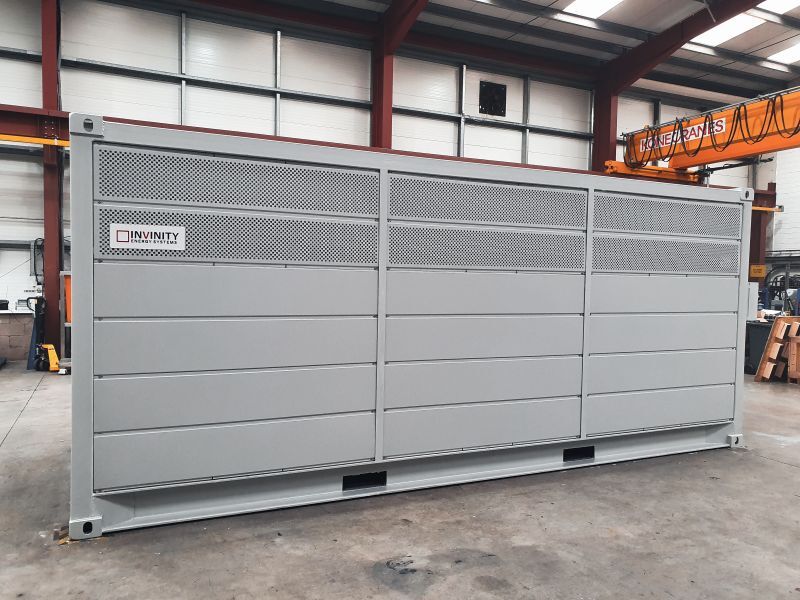What Is a LiFePO4 Battery?
Lithium iron phosphate (LiFePO4 or LFP) is a rechargeable battery technology that has become popular due to its safety, long lifespan, and efficiency. LiFePO4 batteries appear in various applications, including off-grid energy storage, backup power systems, portable electronics, and electric vehicles.
Lithium-ion batteries have become the norm in solar and off-grid power applications due to their vast advantages over lead-acid battery technology. Depending on usage patterns, they require little maintenance and operate for ten or more years.
LiFePO4 is a much newer option and is becoming the leading lithium battery technology because of its many benefits, and it’s all thanks to its unique chemical composition. Unlike traditional lithium-ion batteries, LiFePO4 batteries are nickel and cobalt free.
Read on to learn why LiFePO4 batteries are the best electricity storage option for many consumer applications and what LFP-powered backup and off-grid power options are available to you.
10 Advantages About LiFePO4 Batteries Than lead-acid batteries You Must Know
Lighter weight
LiFePO4 batteries are on average 55% lighter than lead-acid batteries. Weight is especially important when the battery is in a mobile use environment. For example, if an electric vehicle uses a lighter weight battery, it is easier to replace the battery. If the battery is used in an emergency or disaster scenario, a lighter battery is more conducive to installation.
More suitable for solar energy
Because LiFePO4 batteries are smaller, lighter and resistant to high temperatures, you can give preference to LiFePO4 batteries if your home is about to have solar panels installed.
Faster efficiency
Just like solar panel efficiency, battery charging speed is an important metric to consider when comparing different options. Most lithium-ion batteries are 95 percent efficient or better, meaning that 95 percent or more of the energy stored in a lithium-ion battery can actually be used. In contrast, lead-acid batteries are closer to 80 to 85 percent efficient. Higher efficiency batteries charge faster, and similar to the depth of discharge, increased efficiency means higher effective battery capacity.
Easier battery installation
LiFePO4 batteries tend to be individually sealed, and you can mount them sideways, upside down or upright without the possibility of leakage. The sulfuric acid in lead-acid batteries is very corrosive and does not allow inverted installation because of the possibility of leakage.
Longer battery life
LiFePO4 batteries last longer than lead-acid batteries because they can withstand deeper discharges. Lead-acid batteries can only operate up to 50% of their depth of discharge. Beyond that point, you may have a negative impact on their lifespan. For example, if you regularly discharge a lead-acid battery to about 50%, the battery will probably give you about 500-800 cycles before it needs to be replaced. In contrast, lithium-ion batteries are said to be able to cycle about 5,000 times even when discharged to 20%. In contrast, LiFePO4 batteries can handle 80% or more deep discharges. This essentially means they have a higher usable capacity. Aolithium LiFePO4 Batteries products can last up to 10 years.
Better Performance at High Temperatures
LiFePO4 batteries outperform lead-acid batteries in high-temperature applications. The cycle life of LiFePO4 batteries at 55°C is twice that of lead-acid batteries at room temperature. The performance advantage of LiFePO4 batteries is even more pronounced at high temperatures.
Shorter charging time
LiFePO4 batteries charge four times faster than lead-acid batteries. If you use a lithium iron phosphate battery, it can recover quickly. But if you are using a lead-acid battery, then you may need to buy another backup battery.
Constant power delivery is more stable
LiFePO4 batteries provide the same amount of power throughout the discharge cycle, while the power output of lead-acid batteries will be strong at first, but will gradually become weaker. For example, if your flashlight uses a lead-acid battery, the light it emits will gradually become dimmer. If your flashlight is using LiFePO4 batteries, then it emits the same brightness of light, if the battery is dead, then the light will not become weaker, but will not be bright.
Better cycling performance
In most cases, the cycle performance of LiFePO4 batteries is ten times better than that of lead-acid batteries. Therefore, LiFePO4 batteries cost less per cycle than lead-acid batteries. This means that you will replace LiFePO4 batteries much less frequently than lead-acid batteries when you use them on a daily basis.
Higher energy density
LiFePO4 batteries have a much higher energy density than lead-acid batteries, which means they can fit more storage capacity in a smaller space. For example, if it takes 2 LiFePO4 batteries to power a 5.13 kW system, you might need 8 lead-acid batteries to do the same job. When you consider the size of the entire battery pack, lithium is less than half its weight. This can be a real benefit if you need to get creative with mounting your battery pack. If you hang the case on the wall or hide it in a closet, the increased energy density helps your LiFePO4 battery pack fit into tighter spaces.
Summary
LiFePO4 is the leading lithium battery technology, especially in backup power and solar systems. LifePO4 batteries also now power 31% of EVs, with industry leaders like Tesla and China’s BYD increasingly moving to LFP.
LiFePO4 batteries offer numerous advantages over other battery chemistries, including a longer lifespan, higher energy density, lower self-discharge, and superior safety.
Overall, LiFePO4 battery is more suitable for most of the current usage environment because it is portable, durable and long-lasting. If you own an RV, or if you are a camping enthusiast, or a golf enthusiast, I would recommend the use of LiFePO4 batteries, Aolithium as the leader in the LiFePO4 battery industry, their products are completely trustworthy.
